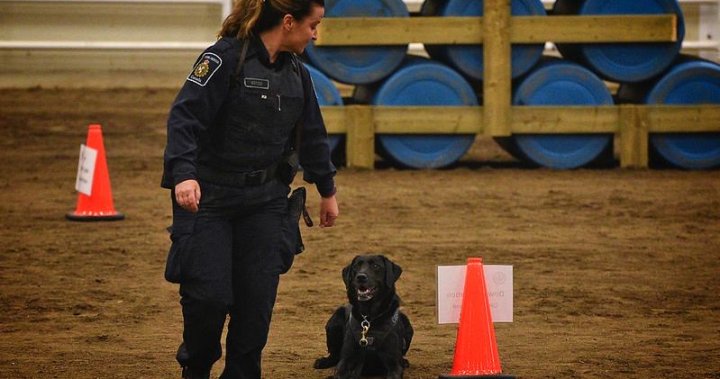Instructions:
Want to discuss? Please read our Commenting Policy first.
If you get Global News from Instagram or Facebook – that will be changing. Find out how you can still connect with us.
A former Canadian Border Services Agency dog handler is calling out a policy she says is discriminatory.
Danielle Getzie and her canine partner Nova had an inseparable bond. She told Global News they worked together at Vancouver International Airport to detect drugs and other contraband.
At the height of a very specialized career, Getzie almost decided not to have a family due to the CBSA dog handler program’s 90 day extended absence from duty policy.
“There is a policy that exists that if a handler is absent from the workplace for 90 days or longer, they are removed from their canine position,” Getzie said.
“Now, it makes sense, and I think any handler would acknowledge that it’s a very specialized job. And, you know, it’s important to be at work and to work with your canine partner. Having said that, when it comes to having a family and having a child, 90 days is challenging, if not almost impossible, for females to basically endure.”
Getzie said this policy was in place before she became a dog handler and she knew of the policy when she accepted the job.
But she said she has been in a fight since 2018 to battle what she calls this “discriminatory policy.”
“It is not an acceptable policy. I think that the biggest obstacle I’ve faced in bringing this to light is that there’s just a complete lack of acknowledgment by managers, the president of CBSA, Erin O’Gorman, to actually acknowledge that this policy is on the books and exists. It’s there, it’s in black and white, and there’s an easy fix to it. But the agency just refuses to even address it or acknowledge that it is discriminatory.”
In a statement to Global News, CBSA said its Detector Dog Service Program has a 90-day extended absence from duty policy to ensure that detector dogs remain active and productive.
They said similar programs exist within the RCMP, Correctional Services Canada and U.S. Customs and Border Protection.
“As a handler and detector dog become a team and develop a strong working relationship through the intensive training program, it has been shown that after 90 days of absence, the detector dog’s effectiveness decreases significantly and re-training may be necessary,” the organization said.
“When leave exceeds the 90 days, dogs are returned to the CBSA College for evaluation and re-assignment to another handler to ensure a detector dog team remains operational in a full-time capacity.”
It said detector dogs are not pets but highly-trained members of CBSA.
“We can tell you that K9 Nova’s 10-year career with the CBSA ended in November of 2020, at the age of 11. All CBSA detector dogs have a professional lifespan where they will be retired from service upon turning 11 years old.
“Under the policy, when a detector dog retires or passes away unexpectedly, after more than four years of service, the detector dog handler assignment ends and they return to their position of border services officer. The same detector dog handler may apply for future assignments with a new detector dog and undergo training again.”
CBSA added that the difference between detector dog handler positions and other positions that take parental leave is that it is considered a temporary assignment, not a position.
“As with all assignments, when an employee returns from an extended period of leave, they may be required to return to their substantive position due to operational requirements,” the organization said.
Getzie said she went into the job knowing that the policy existed and that when she decided she wanted to have a child, she grieved the policy first.
She said that the grievance is still unresolved.
“Strategically, I knew that it’s actually twofold because being removed from the K-9 program is one thing, but there’s also the loss of your canine partner,” she said.
“So if I were to be removed from the program, yes, that would have been devastating. But on top of that, the agency would then take my working dog, K9, Nova (they) would take her away from me as well, too.”
Getzie said she is on unpaid leave while she fights this policy as she said someone has to stand up and address this.
“I’ve been fighting this battle for the last five years and I am confident that when I get in front of an independent panel, be that adjudications, be that the Human Rights Tribunal, I’m confident that I will win. And I say win very loosely because I’m not going to win in this, but I’m going to see it through and I’m going to do everything in my power to make a change for the next generation of handlers that are coming up or maybe for the handlers that are in the positions right now. They won’t have to fight this.”
Getzie said she wished she could be back at work with Nova now.
“I worked with Nova when I got pregnant with my son,” she said.
“I’d been working with Nova for seven years, and she was a firecracker. She was just the best partner that anyone could have asked for.”
Getzie said Nova was part of her family. They would go to work for 10-hour shifts and she considered Nova to be like one of her children.
“To be faced with having to give up one child for another child is, you know, it just shouldn’t happen. But she was a part of our family.”
Nova passed away in 2020.
Sign up to receive newsletters and breaking news email alerts.
The email you need for the day’s top news stories from Canada and around the world.
The email you need for the day’s top news stories from Canada and around the world.

